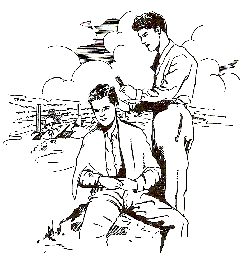|
On 11th of April CCA finished passing through our positions and Task Farce Van Houten was withdrawn to Ostburen far a badly needed rest. It was a beautiful day and the men spent a restful afternoon
doing "parks" and basking in the warm sun. We were alerted to move, but due to a change of plans spent the evening there.
The following morning we moved out an a new mission --- to hold the right flank of the 83rd Division. The approach march proved exceptionally hazardous at night because of steep, winding roads. We retraced our path to Werl, Soest, Paderbarn, to the north of Kassel, Gottingen, Detmold and Barnthum. We proceeded to cross the Weser River in the vicinity af Hameln by pontoon bridge, then continued on to Wolfenbuttle where we crossed the Fuse Canal.
On the evening of the 13th after an all night march we picked up a guide from the 88th Recon --- to take us to Westerhausen ta'relieve the 113th Cavalry. The guide got the company lost in Halberstadt. After clearing Halberstadt, the guide became so completely confused that he led the company within a few
hundred yards of enemy held Quedlinburg.
After the most confused night in our history the Company Commander finally led the company back to Harslehen the 36th Tank Battalion C. P. The company achieved its objective with the second platoon an securing Boyrnecke to the east. Enemy patrols were known to be very active in this area. The defense of this town due to its sprawling nature and the near by woods, proved exceedingly difficult.
As usual everyone was quite put out over the prospects of digging foxholes for this new position. After a great deal of walking and digging that hot day, the men were delighted when same Italian laborers offered to dig holes far them. Jokingly, someone said that each man should have an orderly to do
such jobs. One of the Italians, a barber, offered to give foxhole service. His offer was readily accepted.
|

On April 15th we moved to the new area and set up a skeleton defense with the aid of the tanks. The anti-tank platoon set up road blacks at Achadelehen; the second platoon was located at Winnigen, the third and headquarters were at Konigsaue. The first platoon was attached to A company of the 36th Tank Battalion at Ditfurt.
About 1000 badly starved allied prisoners of war were found in Shadchelen. The majority of them were English but there were also many Americans, Australians and French. They had been liberated by the 83th Infantry Division a few days prior to our arrival. This division had been advancing so rapidly that it was
unable to give them much aid. A few days prior to our moving in after having been organized by a Captain
of the Military Government, they had sustained an attack by fifty, armed S. S. Troopers. Many of the prisoners were found in a very critical condition and all were suffering from malnutrition and dysentery. The 36th Tank Battalion medics were kept busy evacuating the sick and caring for those to critically ill to be moved. We were told by other prisoners, and it was easily seen, that the Yanks had been treated very badly. Within a few days all of the prisoners of war were evacuated to rear area hospitals.
|